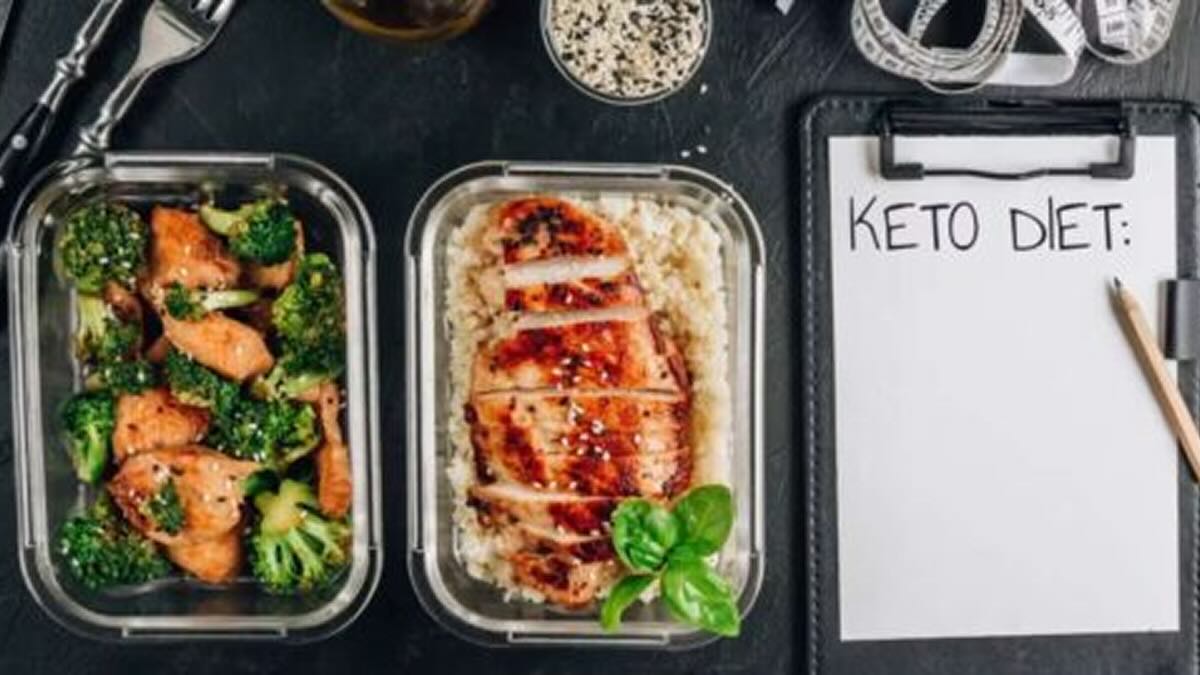You may have heard of the ketogenic (keto) diet and its potential benefits for weight loss, blood sugar control, and mental clarity. But what exactly is a keto diet and how do you create an easy keto meal plan?
As a registered dietitian, I’ve broken down the basics of the keto diet so you understand how it works, its potential benefits and drawbacks, and how to meet your body’s nutrient needs while eating keto. I’ve also created a delicious and easy 7-day keto meal plan through A Better Meal to help you achieve your goals while maintaining proper nutrition.
What Is a Keto Meal Plan?
The ketogenic, or keto, diet is a very-low-carbohydrate diet originally developed in the 1920s to help children with epilepsy control their seizures. In the 1970s, it was championed by Dr. Robert Atkins for weight loss. More recently, it has become popular with people wanting to manage their weight, lower blood sugar and inflammation, and treat certain neurological disorders and chronic conditions.1
By drastically reducing carbohydrates and replacing them with fats, the keto diet sends the body into a state of ketosis. In ketosis, the body uses fat as a fuel instead of glucose.
Here’s a simplified explanation of how this works. Normally, the body uses carbohydrates in the form of glucose for energy. Insulin helps the body’s cells use that glucose. When carbohydrates are severely limited in the keto diet, little glucose is available and the body converts fat into ketone bodies for fuel. This is known as ketosis. Since less glucose is circulating in the bloodstream, insulin levels go down.
Benefits of a Keto Diet
While the keto diet is proven to help control epilepsy, it may provide additional benefits, including weight loss, blood sugar control, decreased inflammation, lower insulin levels, and support for polycystic ovary syndrome (PCOS). Here are some potential benefits of the keto diet and what the research says.
Weight Loss
Studies show following a strict keto diet can lead to significant weight loss, especially in the short term. While people starting a keto diet may rapidly lose up to 10 pounds in two weeks, much of this initial weight loss is due to water loss. After this initial period, people following a keto diet can expect diminished hunger and increased fat loss.2
In one review of well-designed studies, people with obesity and type 2 diabetes lost significantly more weight following a keto diet than other types of diets. They also had significantly reduced waist circumference, hemoglobin A1c (a measure of blood sugar over time), and triglyceride levels.3
However, longer-term studies suggest the keto diet may be similar to other diets in terms of weight loss and harder to maintain over time.4
Improved Blood Sugar Levels
Following the keto diet may help control blood sugar levels in people with prediabetes or type 2 diabetes.
A 2022 study examined the effects of following the keto diet or a Mediterranean-style diet free of added sugars or refined grains on blood sugar levels in people with type 2 diabetes and prediabetes. After 12 weeks, those on the keto diet had significantly decreased hemoglobin A1c (a measure of blood sugar over time) levels, but the improvements were similar to those following the Mediterranean-style diet.5
And while the keto diet led to a greater decrease in triglyceride levels, it also resulted in significantly increased LDL “bad” cholesterol. Further, people following the keto diet ate substantially less fiber than those following the Mediterranean diet.
May Improve Cholesterol Levels and Heart Health
A 2020 study in the journal Circulation found that following a keto diet helped reduce levels of LDL “bad” cholesterol, a risk factor for heart disease.2 However, other studies have found the keto diet actually raises LDL cholesterol.
Whether a keto diet improves or worsens cholesterol levels and heart health may depend on whether carbohydrates are replaced by healthy fats (like omega-3s) or unhealthy fats (saturated and trans fats). More research is needed to understand the keto diet’s effect on heart health and cholesterol levels.
Decreased Inflammation
Research suggests following a keto diet may help reduce inflammation by eliminating sugars and restricting carbohydrates, increasing intake of anti-inflammatory omega-3 fatty acids, and through the anti-inflammatory potential of ketone bodies.6 A 2019 review of studies supported the keto diet’s anti-inflammatory effects, concluding that following a keto diet can lower markers of inflammation.2
Lower Insulin Levels
Weight loss from any diet, including the keto diet, improves insulin sensitivity. However, research suggests following a keto diet may increase insulin sensitivity, even in those who don’t lose weight. A 2023 review of studies concluded that ketone bodies directly influence insulin signaling. 7
Support for Polycystic Ovary Syndrome (PCOS)
Polycystic ovary syndrome (PCOS) is an endocrine condition affecting an estimated 10 to 15% of women. It is associated with obesity and inflammation. Research suggests the keto diet may help PCOS by promoting rapid weight loss, improved body composition, and improved insulin sensitivity.8
Treatment for Neurodegenerative Disorders
The keto diet’s benefits for epilepsy are well-established, especially for people whose seizures aren’t well-controlled with medication (drug-resistant epilepsy). Limited research suggests a keto diet may also help reduce symptoms of Parkinson’s and Alzheimer’s diseases.9
How to Create a Keto Meal Plan
A keto meal plan is very low in carbohydrates and high in fat. It involves eating a specific distribution of macronutrients—about 70% fat, 20% protein, and 10% carbohydrates.3 A classic keto meal plan contains:1
- Limited carbohydrates: No more than 10 to 50 grams of carbohydrates daily
- Moderate protein: 1 gram of protein per kilogram of body weight, or about 68 grams for someone who weighs 150 pounds
- High fat: All remaining calories come from fat
While the keto diet is known for restricting carbohydrates, moderating protein intake is also important because the body can convert protein to glucose.2 People who engage in strenuous weight training may increase their protein intake slightly on a keto diet.
A keto meal plan is very high in fat, so most of that fat should come from healthy fats like monounsaturated (think avocados!) and omega-3 fatty acids. The best sources of omega-3s include fatty fish, like salmon, herring, sardines, mackerel, and trout, flaxseeds, chia seeds, and walnuts.10
Sample 7-Day Keto Meal Plan
Check out our registered dietitian-created 7-day keto meal plan at A Better Meal to make getting started on a keto diet simple and easy.
Safety and Potential Drawbacks of the Keto Diet
Perhaps the biggest drawback to the keto diet is its restrictive nature—to put it plainly, this is a challenging diet to stick with in the long term. Eating more than 50 grams of carbohydrates or even too much protein can immediately send your body out of ketosis.
Further, research suggests weight loss from the keto diet may not be sustained over time.2 If long-term weight management is the goal, you may find greatest success jumpstarting weight loss with a keto diet and gradually transitioning to a more sustainable healthy diet like the Mediterranean diet.
Keto Diet Side Effects
Following the keto diet may result in short and long-term side effects. In the short term, the keto diet may produce symptoms collectively known as the “keto flu.” These symptoms, which typically only last a few days to weeks when a person first starts the diet, include:2
- nausea
- vomiting
- headache
- fatigue
- dizziness
- insomnia
- reduced exercise tolerance
- constipation
Longer terms side effects of following the keto diet may include:2
- Nutrient deficiencies: The restrictive nature of the keto diet may lead to inadequate intake of important vitamins, minerals, and other nutrients.
- Digestive issues: Some people may experience constipation, diarrhea, and bloating from eating large amounts of fat and little fiber.
- Kidney stones: The keto diet can increase the risk of developing kidney stones.
- Heart Disease: Eating high amounts of saturated or trans fats on the keto diet may increase the risk of heart disease.
- Muscle loss: Losing large amounts of weight quickly can lead to muscle loss.
Cognitive decline: Some research suggests low-carbohydrate diets like the keto diet may speed cognitive decline.
Who Should Avoid the Keto Diet?
While keto diets have been used safely for over a century to treat epilepsy, the diet isn’t for everyone. People who are pregnant or breastfeeding should not follow a keto diet. And those with diabetes who use insulin must consult their healthcare practitioner before starting a keto diet, as they can experience dangerously low blood sugar if their medications aren’t adjusted properly.2
People with the following conditions should also avoid following a keto diet:
- Pancreatitis
- Liver failure
- Fat metabolism disorders
- Primary carnitine deficiency
- Carnitine palmitoyltransferase (CPT) deficiency
- Carnitine translocase deficiency
- Porphyria
- Pyruvate kinase deficiency
- Hypertriglyceridemia (HTG)
- Familial hypercholesterolemia (FH)
Takeaway
The keto diet is a very-low-carbohydrate, high-fat diet that may help lose weight, improve blood sugar levels and insulin sensitivity, decrease inflammation, and treat or slow certain neurological disorders. It involves eating no more than 50 grams of carbohydrates and moderate protein daily, with all other calories coming from fat.
Consult a healthcare provider if you’re considering starting a keto diet to make sure it’s safe for you. For quick, easy, and delicious keto meals and snacks, check out A Better Meal’s dietitian-approved 7-day keto meal plan.
References
1. McGaugh E, Barthel B. A Review of Ketogenic Diet and Lifestyle. Mo Med. 2022;119(1):84. Accessed January 28, 2025.
2. Masood W, Annamaraju P, Suheb MZK, Uppaluri KR. Ketogenic Diet. StatPearls. Published online June 16, 2023. Accessed January 28, 2025.
3. Zhou C, Wang M, Liang J, He G, Chen N. Ketogenic Diet Benefits to Weight Loss, Glycemic Control, and Lipid Profiles in Overweight Patients with Type 2 Diabetes Mellitus: A Meta-Analysis of Randomized Controlled Trails. Int J Environ Res Public Health. 2022;19(16).
4. Kirkpatrick CF, Bolick JP, Kris-Etherton PM, et al. Review of current evidence and clinical recommendations on the effects of low-carbohydrate and very-low-carbohydrate (including ketogenic) diets for the management of body weight and other cardiometabolic risk factors: A scientific statement from the Nati. J Clin Lipidol. 2019;13(5):689-711.e1.
5. Gardner CD, Landry MJ, Perelman D, et al. Effect of a ketogenic diet versus Mediterranean diet on glycated hemoglobin in individuals with prediabetes and type 2 diabetes mellitus: The interventional Keto-Med randomized crossover trial. Am J Clin Nutr. 2022;116(3):640-652.
6. Dy?ka D, Kowalcze K, Charuta A, Paziewska A. The Ketogenic Diet and Cardiovascular Diseases. Nutrients. 2023;15(15):3368.
7. Paoli A, Bianco A, Moro T, Mota JF, Coelho-Ravagnani CF. The Effects of Ketogenic Diet on Insulin Sensitivity and Weight Loss, Which Came First: The Chicken or the Egg? Nutrients. 2023;15(14).
8. Barrea L, Verde L, Camajani E, et al. Ketogenic Diet as Medical Prescription in Women with Polycystic Ovary Syndrome (PCOS). Curr Nutr Rep. 2023;12(1):56.
9. Price S, Ruppar TM. Ketogenic therapies in Parkinson’s disease, Alzheimer’s disease, and mild cognitive impairment: An integrative review. Appl Nurs Res. 2023;74.
10. Omega-3 Fatty Acids – Health Professional Fact Sheet. Accessed January 28, 2025.

